ISLAMIC POLITICS BY SNOUCK HURGRONJE AS ADVICE TO DUTCH INDIES GOVERNMENT TO REDUCE ISLAM POWER IN INDONESIA
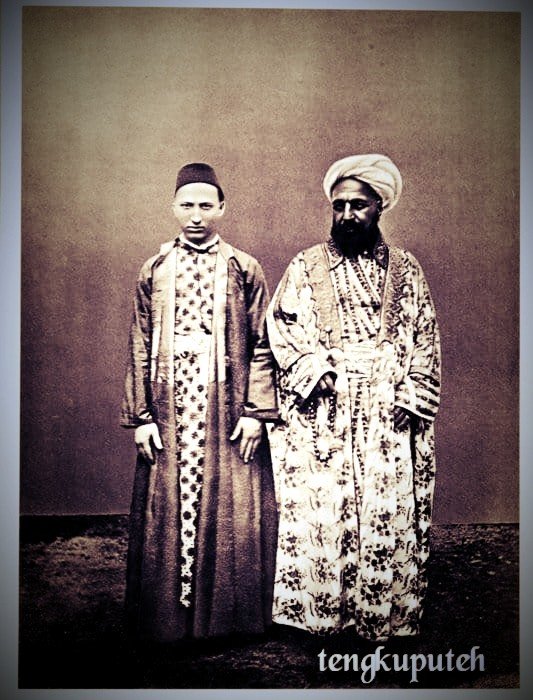
ISLAMIC POLITICS BY SNOUCK HURGRONJE AS ADVICE TO DUTCH INDIES GOVERNMENT TO REDUCE ISLAM POWER IN INDONESIA
Background of Islamic Politics by Snouck Hurgronje
At the end of the nineteenth century the Dutch who had established their power in the archipelago (present-day Indonesia) were confronted with the problem of the continuous resistance of Muslims, although repeatedly able to defeat the struggle they are very worried about the dynamics that occurred at that time. For that it is important to design Islamic Politics policy to maintain Dutch power forever in Indonesia.
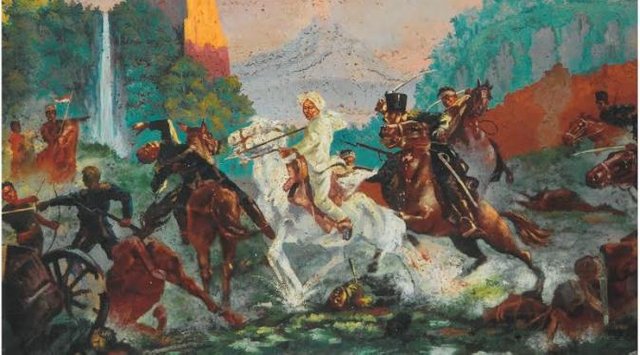
Diponegoro War (1825-1830)
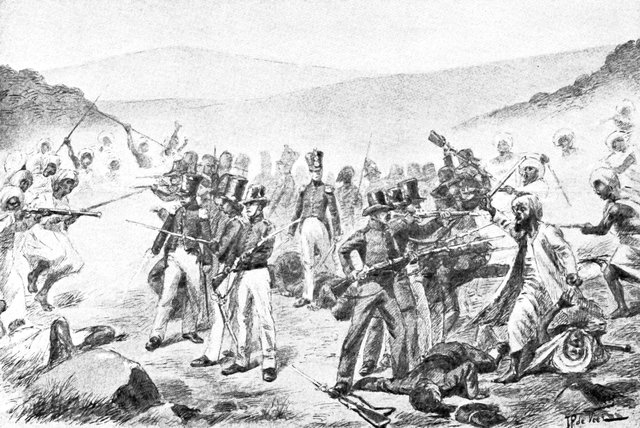
Paderi War 1821-1837
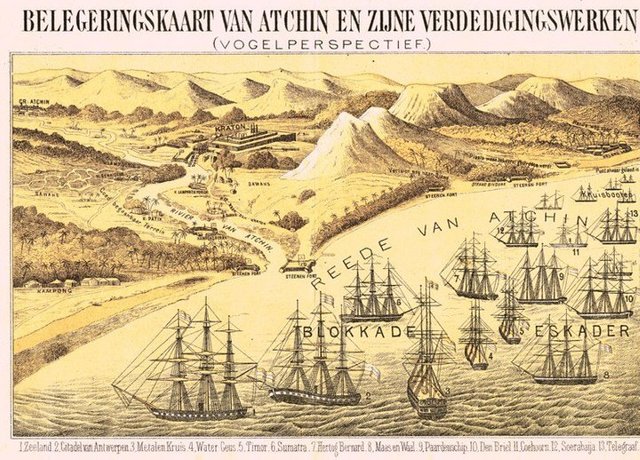
The Dutch warship fleet besieged the coast of Aceh in 1873
Meanwhile elsewhere in 1880 the Aceh War still raged violently, although the Dutch managed to occupy the Sultan's palace on January 26, 1874 but the Sultanate of Aceh is still running under the Sultan Tuanku Muhammad Daudsyah, although the capital of Aceh State moved from Pagar Aye, Indrapuri, Keumala and other places. During the 6 years of war the Dutch had lost 17,000 troops in Aceh.
The Dutch government felt the need to recruit an expert to deal with the problem then recruited Prof. DR. C. Snouck Hurgronye an Islamologist who in 1880 defended his dissertation entitled "Het Makkasehe Fest" (Great Mecca Celebration).
Assignment of Snouck Hurgronje to Mecca
So in 1884 Snouck Hurgronje sent the Ministry of Colonies to study Malay to Arab, this is because at that time the Dutch difficulty sending agents to Indonesia. Since Snouck has not mastered Malay, he must first learn Malay to Arabic to Malays (Indonesia and Malaysia today) in Arabia.

Snouck Hurgronje as Abdul Ghaffar in Arabia, later nicknamed Tengku Puteh by the people of Aceh.
In Arabic during the first six months of Snouck living in Jeddah managed to get along with scholars from the Indonesian archipelago while studying Malay, he related closely was Raden Aboe Bakar Djajadiningrat and invited Snouck Hurgronje to be Muslim on January 4, 1885 and renamed Abdul Ghafar. Surely he did not seriously enter Islam, Islam is a thing that must be studied seriously and should be treated wisely by the Dutch Colonial Government.
During the Arab study of all books of interpretation include Tafsir al-Baidhawi, al-Bajuri, al-Ikna 'and Tuhfah. Then he moved to Mecca. He mixed with scholars right up to his return to Holland in 1885.
While in Arabia studying all the books of Qur'anic commentary include Tafsir al-Baidhawi, al-Bajuri, al-Ikna and Tuhfah. Then he moved to Mecca. Then he moved to Mecca. He mixed with local scholars to return to Holland in 1885. Three years after Snouck returned to his country, he published two volumes of books entitled Mecca. When the book was circulated the famous name Snouck Hurgronje to the whole world, it was regarded as a very important book for the purposes of colonial politics in the world.
Assignment of Snouck Hurgronje to the Indies
While in Mecca, Snouck had a close relationship with an Acehnese scholar named Habib Abdurrahman Az-Zahir. The cleric is a former advisor to the Sultan of Aceh, Alaiddin Mahmudsyah (1870-1874 AD). But he lost confidence by the Acehnese so surrendered to the Dutch government, then the Dutch government gave a lifetime pension to Habib Abdurrahman to live in Mecca.
Based on his understanding of Aceh in Mecca, he offered to the Ministry of Colonies to be assigned to Aceh. In 1889 he landed in Batavia. Soon the Governor-General C. Picnaeker Hordijk appointed himself as an official advisor of Eastern Language and Islamic Law for the Dutch East Indies government in the archipelago. In fact, prior to the arrival of Snouck Hurgronje to Indonesia, the Dutch had established "priesterraden" (1882) in charge of overseeing the growth of Islamic schools in Indonesia, but this effort failed.
After he was appointed as an advisor to the Government of the Dutch East Indies through the office of Van Inlandschen Arabiche Zaken, he gave 8 suggestions, among others:
- The Dutch East Indies government should not be afraid of the influence of Indonesian Hajjs when the government approaches the Mecca clerics who become Indonesian haj teachers by making them friends, hence the influence of Indonesian haj that threatens stability will end;
- The Dutch Indies government need not fear Pan-Islamism. Islam is different from the Catholic who has the papal organization. The Caliph Ottoman himself had preserved the Pan-Islam program;
- To be feared by the Government of the Dutch East Indies "not Islam as religion, but Islam as a political doctrine". Usually led by a small minority of fanatical scholars. Namely those who devote themselves to the ideals of Pan-Islamism, if its influence spread to the villages would be very dangerous. It is therefore recommended that the government "act neutrally against Islam as a religion and firmly to its political doctrine";
- The Dutch East Indies government must prevent Islamic scholars from entering the government (executive). Because it is impossible to establish a relationship between the Christian (Dutch) rulers with the majority Islamic government;
- The Dutch East Indies government had to narrow the space and influence of Islam. This can be achieved through cultural cooperation between Indonesia and the Netherlands. This can begin by using the priyayi class as a civil service. For that the priyayi group should be educated with Western education;
- The Dutch East Indies government must revive the customary groups, and they must be used against Islam. This contradiction can be achieved by establishing customary institutions based on local tradition, in contrast to a universal Islam;
- Especially for the Aceh War, Snouck Hurgronje advised against running military operations into the countryside and "cracking down on the clerics in the villages and not allowing Muslim clerics to strike force with their students as volunteers", to ordinary Muslims the government must be convinced that "the government protects Islam." This effort can be carried out with the help of the heads of the nobility;
- The government must always separate Islam as a religion and Islam as a political doctrine. The longer the distance between the two will further accelerate the destruction of Islam.
Assignment of Snouck Hurgronje to Aceh
In 1893 Snouck was assigned to Aceh with his main task of drafting his suggestions on the completion of the Aceh war with the Dutch. The first time Snouck lived in Aceh was at Ulee Lheue as the headquarters of the Dutch military. It was in Ulee Lheue that Snouck succeeded in preparing his first report on Atjeh Verslag Aceh as the report on which the Dutch policy and the military were built in the face of Aceh.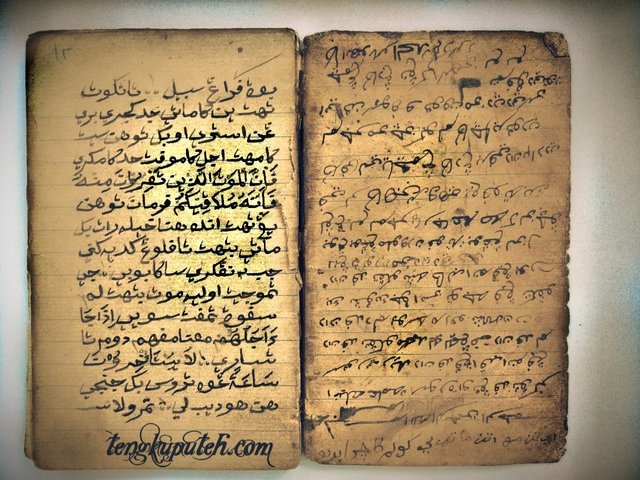
Syair Hikayat Sabi War Collection of Museum of Aceh, contains religious poems calling on the people of Aceh to fight against the Dutch colonizers.
According to van Koningsveld, the first part of Snouck's report on Aceh is a description of the anthropology of Acehnese society, the influence of Islam as the basis of Acehnese beliefs, and the role of ulama (Muslim intellectuals) and Uleebalang (nobles) in Acehnese society. In the report Snouck also described that the Aceh war was waged by the 'ulama, while the Uleebalang according to Snouck could be invited to be a candidate for the Dutch allies, as their interests were worldly profits.
Snouck also writes that Islam for the people of Aceh must also be judged negatively, as Islam can evoke anti-Dutch fanaticism among the people of Aceh. Therefore, religious leaders in the Acehnese society should be annihilated so that the influence of Islam becomes less in Aceh. Thus the Uleebalang according to Snouck will easily be invited to ally with the Dutch.
One failure of the Dutch government in Aceh, according to Snouck is the result of a lack of Dutch knowledge of Aceh as an Islamic region. That is why, when Snouck served in Aceh, in addition to studying the anthropological character of his community (Aceh's customs and culture), he also studied the books of Acehnese scholars. Among the books of Umdatu al-Muhtajin written by Sheikh Abdul Rauf Syiah Kuala, as a book that is considered Snouck very influential for the development of the Syatariyah Order in Aceh. During his assignment he produced the Book of De Atjehers (two volumes: 1893-1894) which Snouck wrote about Aceh.
Islamic politics by Snouck Hurgronje
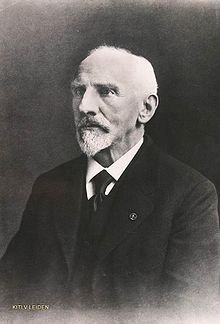
Christiaan Snouck Hurgronje. Occupation Professor, author, spy, colonial advisor.
SNOUCK Hurgronje (1857-1936) was a controversial Dutch scientist. On the one hand, however, Snouck Hurgronje must be acknowledged as the actor and recorder of history who has made the most valuable contribution in understanding the twists and turns of Dutch Indies government politics in Indonesia. On the other hand for Muslims in Indonesia, Snouck has abused Islam for Dutch Colonial political interests in Indonesia including in Aceh.
Snouck Hurgronje is considered the culprit of the emergence of conflicts of understanding of Islam in Indonesia. He served as a devotee of Dutch political interest in his day, as well as a cleric on behalf of Sheikh Abdul Ghafar.
Or as an expert scientist about Islam (Islamology) in the perspective of Islam and as a scientist in academic perspective, or as a historian and role when he served in Indonesia as well as in Aceh.
Translate from Bahasa: Politik Islam Oleh Snouck Hurgronje
Articles about Aceh:
- CUMBOK WAR, A SOCIAL REVOLUTION IN ACEH (1946-1947); 8 April 2017;
- ACEH THE FIRST SOVEREIGN COUNTRY TO RECOGNIZING THE INDEPENDENCE OF THE NETHERLANDS; 27 April 2017;
- SAMUDERA PASAI AS THE FIRST ISLAMIC KINGDOM IN SOUTHEAST ASIA; 6 June 2017;
- ISLAMIC SHARIAH WHO IS AFRAID, A CASE STUDY IN ACEH; 13 June 2017;
- ACEH WOMEN FULL POWER; 13 June 2017;
- GOLD, INFIDELS, AND DEATH; 10 July 2017;
- MANTE THE LOST PYGMY TRIBE; 13 July 2017;
- THE ORIGIN OF THE COFFEE CULTURE IN ACEH; 19 August 2017;
- THE UNTOLD STORY ABOUT HISTORY OF THE COMMUNIST PARTY OF INDONESIA IN ACEH PROVINCE; 28 September 2017;
- WHEN CRITICISM IS FORBIDDEN; 14 October 2017;
- EXPLOITATION OF NATURAL RESOURCES, WHAT IS IT GOOD FOR ACEH; 5 November 2017;
- PEUCUT KHERKOFF, ACEH-DUTCH WAR MONUMENT; 12 November 2017;
- THE PRICE OF FREEDOM; 5 December 2017;
- ACEH CRAZY OR ACEH PUNGO; 25 February 2018;
- MARSOSE CORPS, THE DUTCH SPESIAL ARMY DURING ACEH WAR; 19 March 2018;
Posted from my blog with SteemPress : https://tengkuputeh.com/2018/07/09/islamic-politics-by-snouck-hurgronje/
Good story which many people in aceh don't know about him, they can understand after reading your article as important history in aceh many years ago
thanks very much
You are welcome!